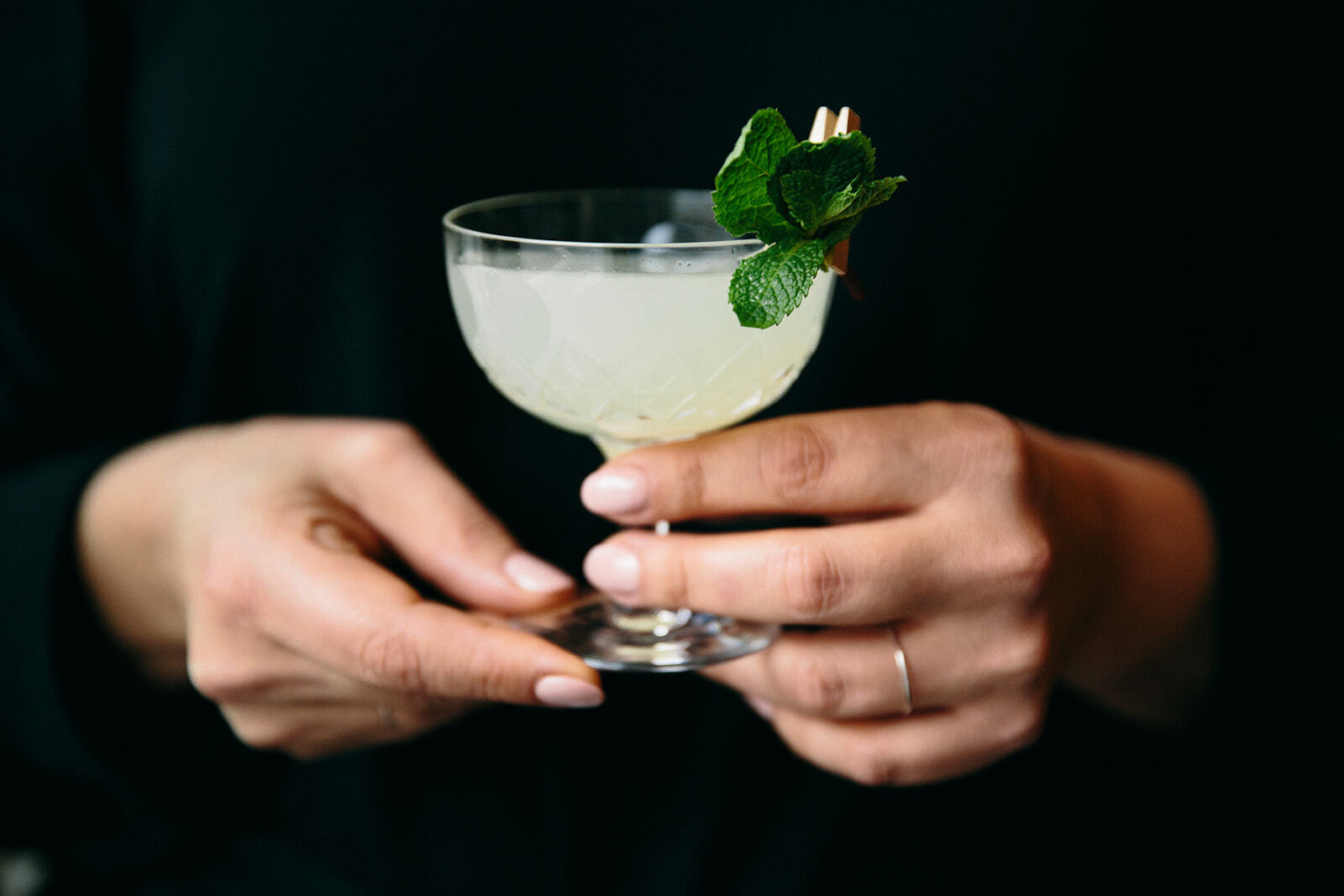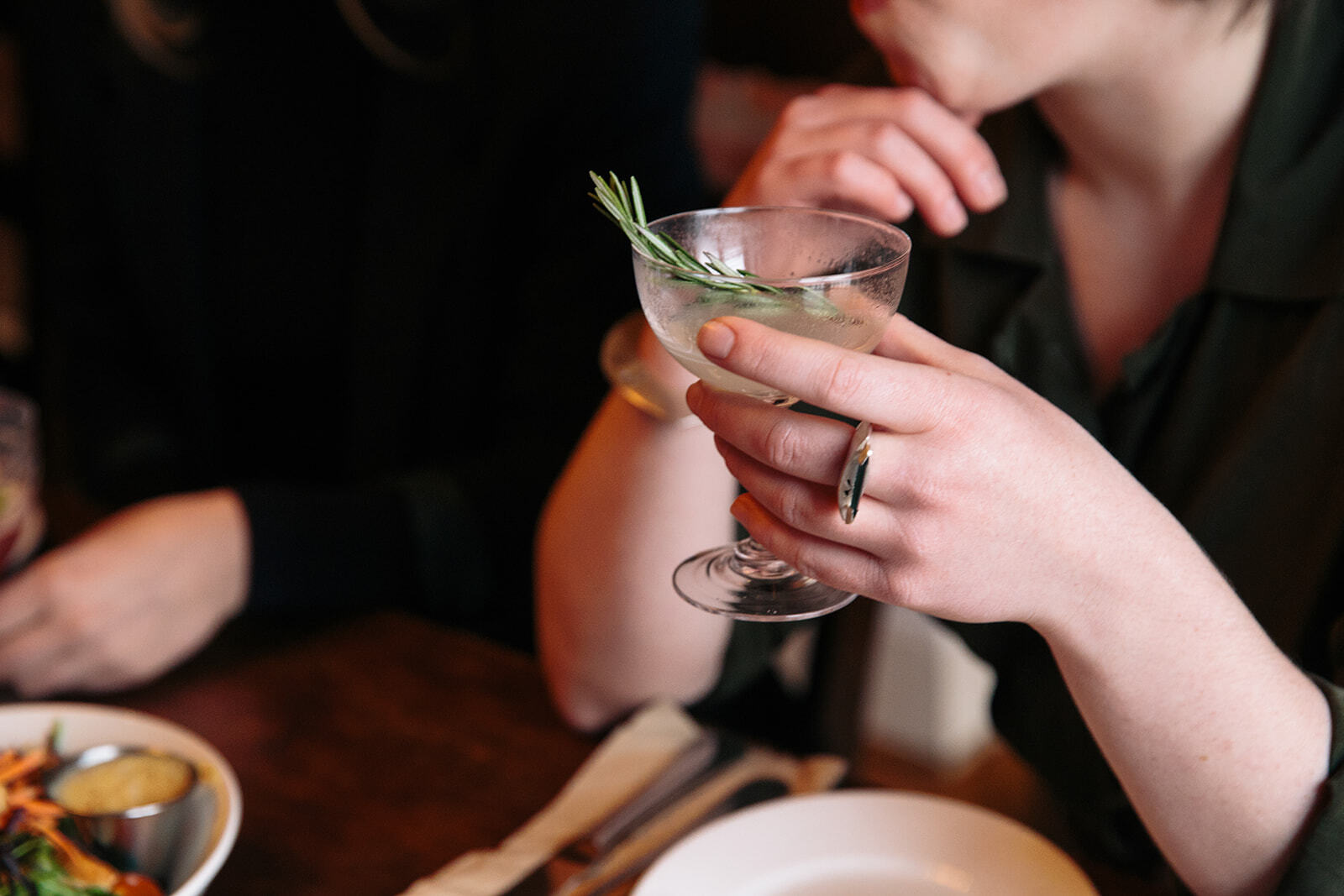When I picture a cocktail, I see Carrie Bradshaw drinking a cosmopolitan in the hustle and bustle of New York City or James Bond ordering a martini (shaken, not stirred), drinks in which liquor is either the star of the show or a good team player.
The invention of punch was supposedly a way to tame the harshness of liquor by adding citrus, sugar, water, and spices to the rum and arrack British sailors drank on their ships—a pirate’s cocktail. Drink historian David Wondrich points to health elixirs or “stimulating liquors” meant to put a pep in one’s step as part of the cocktail’s ancestry.
My own introduction to alcohol was Britain’s university drinking culture, which was less about taste and more about potency at an affordable price. Cocktails were few and far between for me then, aside from the occasional espresso martini or white russian, which featured familiar notes found in coffee liqueur. (What do university students love more than booze? Coffee.) I have always associated cocktails with a level of elegance that comes from a layered and complex tasting experience, the way a restaurant’s dish may challenge or surprise one’s palette.
I’ve stopped drinking alcohol, but that refined drinking experience doesn’t have to go away with it. Non-alcoholic drinks have surged in popularity, with “sober curious” movements like Dry January and Sober October prompting people to seek alternatives while curbing or reducing their alcohol intake. Statista reported that about 50 per cent of Gen Z and millennials have cut back on their drinking since 2023, and the non-alcoholic beverage market is on track to become a multitrillion-dollar industry. Unlike non-alcoholic beer or de-alcoholized wine, zero-proof spirits hitting the market today are designed with a robust taste in mind, whether you take your “liquor” neat or mixed in the non-alcoholic version of any cocktail of your choosing.
Alayne MacIsaac enjoys actual spirits, but she wanted to create an elegant cocktail experience for herself and others looking for an alcohol-free option. She launched her line of non-alcoholic spirits, Lumette!, in late 2019, after spending considerable time convincing her fellow Sheringham Distillery co-founder (and husband), Jason.
“To me, it’s just romantic,” MacIsaac says, “to be able to order a gimlet or a sour in a coupe, or something that comes with this big rock of ice was always exciting for me.”
She mentions distilled botanicals, something MacIsaac isn’t a stranger to at Vancouver Island’s Sheringham. Notes of juniper and citrus in Lumette’s answer to a London Dry Gin or cloves and molasses in their non-alcoholic rum give the two enough familiar flavour for a one-to-one swap with their alcoholic counterparts in any cocktail.

“The fun thing with the non-alc is you don’t have to reinvent the wheel,” says Angela Hansen, owner and founder of Mocktails, a non-alcoholic liquor store on Commercial Drive (some people object to her use of the term “liquor store,” she tells me). “It’s about having that complexity to the spirit.”
While I was at Mocktails, named for the eponymous dry mixed drinks, Hansen had me sample Spiritless’s Kentucky 74, a zero-proof bourbon that still has that signature bourbon burn. Some non-alcoholic whiskeys use capsaicin, an active component found in chili peppers, to mimic the burning sensation in a traditional Kentucky bourbon, while others such as Monday’s Zero Alcohol Whiskey add citric acid and proprietary spice blends to achieve that same heat. Montreal’s HP Single Malt uses whisky ingredients such as Scottish malt and traditional techniques to distil its zero-proof spirit in a copper still. When I mixed Lumette’s Lum Rum into a maple syrup dark ‘n’ stormy at home, I noticed that the allspice, cloves, and cinnamon generated more warmth once paired with a Fentimans ginger beer.
“People who do drink don’t quite understand how that feels, how left out and on the sidelines you feel, so being able to have this, you feel more included,” Hansen says.
Hansen’s clientele isn’t limited to those in recovery, like her and myself, but also includes those who are reducing their alcohol intake or changing their relationship with alcohol. In her store, she displays vintage glassware in soft lighting alongside shelf after shelf of non-alcoholic wines, spirits, premixed cocktails, and “functional beverages” that contain adaptogens to reduce stress.
“You can remove something harmful like alcohol and replace it with something good for you and still have this adult, elevated experience,” she says. Beverages such as Bella Hadid’s Kin Euphorics or British Columbia’s very own Hai Tea fall into that functional category, featuring reishi mushrooms or damiana, which reportedly lift or mellow one’s mood.
Hansen has been sober for over two years now and considers Mocktails a full-circle achievement. “To bring this to the neighbourhood means a lot to me,” she says. “This was where I got into a lot of my trouble.”
Even premixed canned non-alcoholic cocktails are giving their boozy counterparts a run for their money. Calgary’s Gradient Beverages’ Inversion Cocktail is a line of nitrogen-infused canned drinks. Shaking the can before drinking releases a layer of foam commonly associated with sours. In alcoholic sours, the foaming comes from aerating egg whites and other thickening agents. Even without the use of liquid nitrogen, nondrinkers and non-egg consumers alike can opt for vegan foamer drops (some may contain alcohol) or aquafaba (chickpea water) powders to add a classic element to their drink. Local makers such as Edna’s and Aelo have their zero-proof gin and tonics, margaritas, mules, mojitos, and more on grocery store shelves all over the province.
Both Hansen and MacIsaac hope to make the niches they’ve carved out so inclusive and inviting that having zero-proof options on the cocktail menu at restaurants and bars is the norm, not the exception.
“Instead of getting pop and free refills, not only are you able to offer this cool experience to your customers, but you’re also getting another $10, $12,” MacIsaac notes. “It’s better for all people involved.”
Those added menu options go even deeper, inviting more people into long-standing traditions in all kinds of ways. MacIsaac recalls one gentleman who was grateful to her for creating a non-alcoholic gin after starting medication that prevents him from drinking alcohol. Throughout their marriage, he and his wife have enjoyed a gin and tonic together every night, and he now gets to continue sharing this ritual with her thanks to MacIsaac’s passion for cocktails.
Hansen hosts tastings at Mocktails regularly, and she reminisces about a group of real estate agents she once hosted who were surprised that they could still go to the gym or go see a film after a drinks event for work.
As for me, I don’t have to look out of place or feel awkward when out with friends at a bar or restaurant. I can partake in a way that suits me.
“It’s about feeling thought about,” Hansen says. “I think being able to have this, you just feel more included.”









